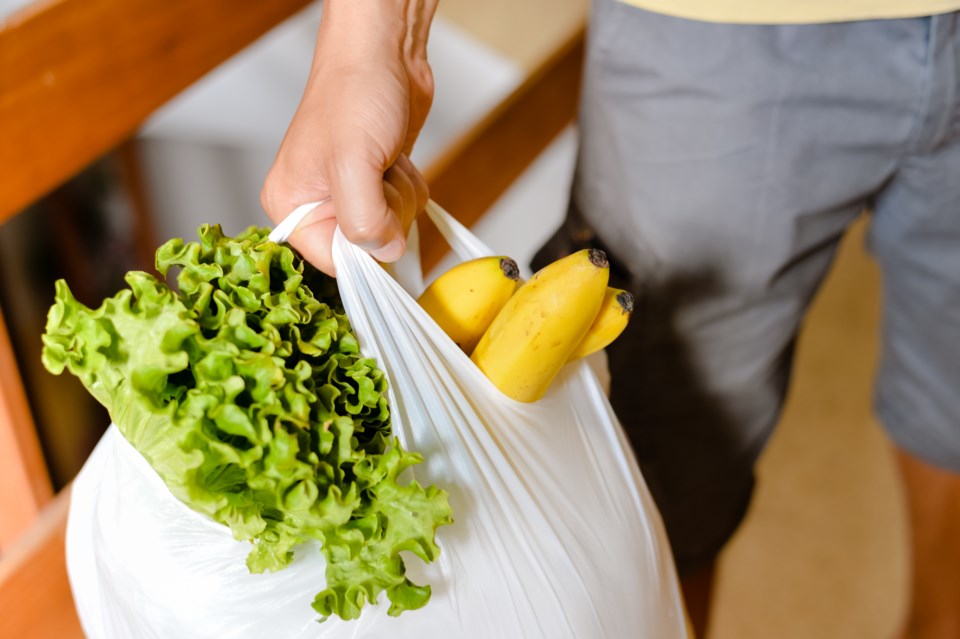To paraphrase someone who posted on the GuelphToday.com article on the subject, not to mention Charles Dickens, “It was the best of ideas, it was the worst of ideas.”
Plastic Free Guelph last week announced that they will present a plan to city council at the July 23 meeting to institute a city-wide ban on single-use plastic shopping bags. Though it’s been tried many places, and in many ways, Guelph would be the first municipality in the province to make a ban happen, if approved.
The metrics are pretty staggering. In 2016, the World Economic Forum issued a report that said plastic in the ocean would outweigh fish pound for pound by 2050. By the numbers, 70 per cent of the plastic we produce ends up in landfills or the ocean, making plastic accounts for 6 per cent of global oil consumption, and 1 per cent of the global carbon budget, which is how much emissions we can produced before global temperatures increase more than 2 per cent per year.
Of course, a lot of the attention has been on the “Great Pacific Garbage Patch,” a floating island of trash that’s now the size of three Frances spread across the ocean between Hawaii and California.
But can not buying a plastic bag in Guelph make sure that the GPGP does not grow to the size of four Frances?
Answering that question with “No” will likely be the answer for the cynical, and the ones that don’t want to lose a precious convenience. While it’s true that much of the GPGP is discarded fishing gear, and that 60 per cent of it comes from five Asian countries in or off the Pacific, there’s a simple fact in the favour of Plastic Free Guelph and their desire for a plastic bag ban.
We’re heading there anyway.
I work in retail and the store, which is one of several in a cross-Canada chain, recently made the switch to start charging 5 cents for every plastic bag. It offered a rare insight into the mind of the consumer on this issue because so many places already have such a charge, but how would the people react where a once dependable store for free bags added a surcharge?
I can count on one hand the people that have made a fuss in the last four months.
It turns out that the vast majority of people either bring their bags, buy a bag, or don’t bother buying one so long as they can carry all their purchases from the exit to the car. In other words, the market has decided, which should make at least one person happy.
Mayor Cam Guthrie posted on Twitter his response to the proposed ban saying, “Just one of the things I admire about Guelph citizens and businesses is that they don’t need government interference or new bylaws to make these types of decisions.”
That’s true, and the anecdotal evidence is encouraging, but can we be so complacent on this that we can sit on our laurels and wait for the market to take its course? Two recent studies are concerning.
One out of England said that 86 per cent of the 94 teenagers participating in a study of Bisphenol A (BPA) showed the syntenic compound used in plastic containers and bottles present in their urine.
A second study revealed the presence of microplastics in 11 different brands of bottled water including Desani, Evian, Aquafina, and yes, Nestle Pure Life.
When science linked rising lead levels in the human bloodstream to Tetraethyl lead gasoline in the early 70s, leaded gas was phased out of availability. Are we standing on the cusp of another health revelation about the real toll of our plastic fantastic world?
I’m sure some of you are reading this and thinking, “Be that as it may, getting rid of plastic grocery bags is still low hanging fruit.” You’re right.
In the human condition, I think, is the idea we have to clear the low hanging fruit before reaching up for those higher branches. Also in the human condition, I fear, is this idea that society peaked in the mid-20th century, and any change is making life needlessly complicated.
I’ve been around long enough to remember the outrage about Wet/Dry Plus. While Guelph led the way on sorting and disposal of solid waste, there were those that were offended by the idea of not being able to throw their trash into a big black bag and sent it God knows where anymore.
But we’re constantly being confronted by the offspring of our pride and carelessness. It’s happened with lead, it’s happened with CFCs, it’s happened with carbon, and maybe now it’s happening with plastic.
There are more than a few legitimate questions about how plastic is negatively affecting our world, and if we can’t ask them on the local level, then why the heck should we ask them on the global?
